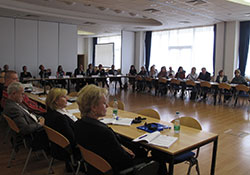Evaluation of the organization and provision of primary care in Slovakia

WHO
Primary health care (PHC) is generally considered to be a fundamental part of the health system. However, its functions and competencies have recently been reduced in many countries and its gate-keeping role challenged. To strengthen the national capacity and to assess the quality of provided primary health care services, WHO has developed a Primary Care Evaluation Tool (PCET). It consists of a set of three questionnaires enabling the assessment of aspects of the organization, the provision and the utilization of primary care. The application of the tool aims at providing information on the current state of primary care, identifying health policy priority areas and drafting recommendations for improving the situation in the country concerned.
In Slovakia, there are three types of doctors working in primary care: general practitioners for adults (GPsA), general practitioners for children and adolescents (GPC&A) and primary care gynaecologist-obstetricians (PCGyn). Majority of them work in solo practice. Only very seldom, when they are employed by the regional self-governing authorities or municipalities, and sometime by private entrepreneurs, they are grouped in policlinic type of facilities. Practitioners are independent health care providers. There were signals of potential serious crisis of GPA and GPC&A. It was claimed that most of the GPs are close to the age of retirement, there was a lack of regulation on selling their practice, they are insufficiently paid through contracts with insurance funds, which are responsible to ensure the guaranteed minimum number of providers in a given area. There are neither guidelines nor systematically evaluated quality indicators.
These were the reasons why the Ministry of Health of Slovakia had requested the evaluation of its PHC by WHO/Europe. Field work with questionnaires took place from October - June 2011, and a draft evaluating report with a set of recommendations was organized by WHO/Europe experts.
On 2 November 2011, a workshop to validate the findings and recommendations contained in the report was held at the Ministry of Health of Slovakia in Bratislava, with the participation of the WHO/Europe experts and key PHC stakeholders from Slovakia. Their constructive discussion led to an agreement upon a substantial part of the report. It has been emphasised that PHC must get more attention from the ministry regarding the regulation of their education and the setting of norms for their number, distribution and financing: only then will PHC be able to properly fulfil its functions and become a people-centred part of the health system.
The full text of the report for public distribution will be available in December 2011, and its electronic version will also be placed on the local web site of the WHO Country Office, Slovakia.



